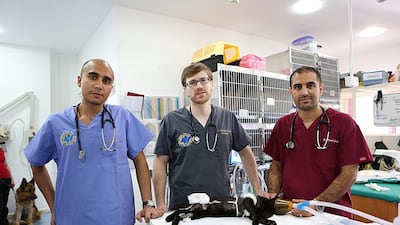ABU DHABI // A team of quick-thinking vets saved a man’s life after he had a heart attack and collapsed in the street outside their clinic.
They rushed out to the pavement, where they performed cardiopulmonary resuscitation, fitted an oxygen mask and removed blood clogging his airways.
The drama began when Klaus-Dieter Bielitz, 56, and his wife Jennifer were picking up their pet cats from the British Veterinary Centre in Khalidiya.
Mrs Bielitz went inside, and when she came out she found her husband slumped and unconscious behind the wheel of their car.
Her cries for help were heard by the vets who took turns to perform chest compression in rotation until an ambulance arrived 20 minutes later.
“He was completely blue, I couldn’t find a pulse,” said Dr Ahmad Jakish, who lowered Mr Bielitz out of the car and on to the pavement so they could perform CPR.
“I checked with my stethoscope – nothing. I thought he was pretty much dead.”
“I didn’t know how long he had been without a pulse so I began compressing his heart,” Dr Jakish said.
“For the first five minutes it was not successful, then he started breathing and his colour was better, but there was still no pulse.
“His heartbeat then started and stopped, but eventually we got a good rhythm.”
Two other vets helped Dr Jakish with CPR and nurses brought out a mobile oxygen unit and heart monitor.
“It took 15 minutes for him to start breathing and to get a good heartbeat,” said Dr Jakish. “Pumping the chest correctly with both hands is very tiring so we took turns. It was a team effort. Everyone contributed to get him the help he needed.
“We needed to pump 100 times a minute and do it for two minutes.”
The pavement quickly became a makeshift emergency ward as the vets cleared Mr Bielitz’s mouth of saliva and blood to fit the oxygen mask.
Nurses repeatedly lifted his legs to aid blood flow to the heart and brain. The vets spoke to Mr Bielitz quietly to calm him because he was disorientated when he regained consciousness.
Staff pulled an extension cord outdoors so electrodes could be placed on his body for the heart monitor.
Mr Bielitz was conscious and able to communicate when the ambulance arrived. He has been under observation at Sheikh Khalifa Medical City since the incident on May 12.
It was the vets’ first emergency procedure on a human being.
“I was trained to do this on animals,” said Dr Nicolas Terraz. “The big contrast for us was the size of patient because we’re used to dogs and cats.
“Quick intervention, compression and oxygen made a difference. We were tired and relieved by the time the ambulance came. It took some time to realise what we had done.”
For Dr Rajat Mukherjee it was a surreal experience. “It was like he had died because he wasn’t breathing and there was no heartbeat.
“He was dead for two to three minutes and then came back to life. We’re amazed and happy he is alive and have our fingers crossed that he will do well.”
Life-support training is important for everyone, not just the medical fraternity, doctors say.
“It is crucial CPR was given because this saved a life,” said Dr Sara Malik, a family physician with the Dubai Health Authority.
“People who are not medics should also train in basic life support. The community must be engaged and involved.”
The vets agreed. “Imagine if somebody is dying and you can’t help him?” said Dr Jakish.
“Even those without a medical background can do simple procedures until help arrives. For us, we cheered each other later because we realised we saved a life.
“To save an animal’s life is great, but this was different.”
rtalwar@thenational.ae


